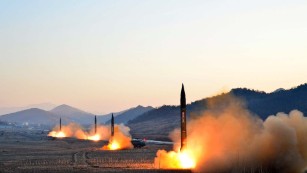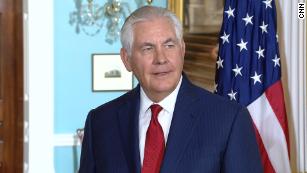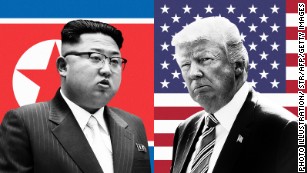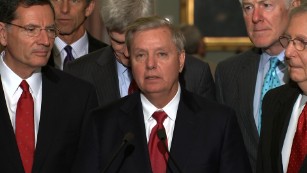Is this a good thing that Kim Jong Un and Trump are both ruthless? If Kim was protecting his own people instead of just starving them to death and murdering them for his own selfish ends Kim's ruthlessness might be a good thing.
And even though Trump isn't murdering people directly yet like Kim does, still people are dying all over the world because of the crazy decisions Trumps makes. For example, if Trump deports 800,000 DACA kids to places they don't know anyone usually, because they never lived there since they were babies, how many of these kids are just going to commit suicide from being rejected by the only life and country they know? So, at this point you could easily say that Trump murdered these young people who kill themselves because of being deported from the only country they have ever known as older children or adults if this happened. Now, Trump is only an indirect cause of death in millions of people's lives around the world at this point. So, we will have to see what the future holds
By the way I have always believed that Kim wants nukes to blackmail the whole world with them sort of the way Drug Lords blackmail people and if they don't do what the Drug Lords want they nuke them (in Kim's case). So, I fully expect Kim to put nukes into Submarines and then hold non-nuclear nations hostage for ransom around the world. He's not going to do that to the U.S. or China or Russia because all three would nuke Kim if he did that. But, other nations he might threaten with nukes or chemical weapons or whatever he wants to do to blackmail nations for money and goods.
begin quote from:
This is why the CIA thinks Kim wants nukes
Kim Jong Un: What we know about him 01:43
Washington (CNN)CIA
Director Mike Pompeo said Tuesday that the US intelligence community
still considers North Korean leader Kim Jong Un to be a "rational actor"
but that assessment does not mean he is only developing nuclear weapons
as a means to preserve his regime.
"We
do believe he would use these tool sets beyond self-preservation,"
Pompeo said at the the American Enterprise Institute, adding that Kim is
likely prepared to use both nuclear and conventional military forces
for "coercive" purposes with the intent of reunifying the Korean
peninsula under his rule.
While
the CIA has long highlighted North Korea's rapid improvements in the
capacity and rate of its intercontinental ballistic missile tests,
Pompeo emphasized that Pyongyang's progress should be measured by
reliability rather than in timelines.
"Kim
Jong Un will not rest with one single successful test" that
demonstrates he has the ability to hit a US city with a long-range
nuclear weapon, Pompeo said.
"His
next move would be to develop an arsenal" or the capacity to deliver
missiles from multiple firing points simultaneously, he added, noting it
is "our mission is to make the day that he can do that as far off as
possible."
Pompeo
declined to answer whether the US could conduct a limited military
strike on North Korea without provoking a full-scale conflict, but did
say that US intelligence and military agencies continue to prepare a
series of options for President Donald Trump should diplomacy fail to
achieve the stated goal of denuclearization.
The
White House has long maintained that all options are on the table when
it comes to dealing with North Korea and most of Trump's top national
security advisers have said that military options should be reserved
pending an imminent threat to the US or allies.
But
Trump's provocative rhetoric and suggestions that the administration
could be considering a "preventative war" have raised concerns that he
may be more willing to engage in a conflict on the Korean peninsula than
past presidents.
Asked if the US
would be willing to live in a world where North Korea could destroy New
York with the push of a button, Pompeo said that decision is ultimately
up to the President but stressed that Trump has been unambiguous on that
point.
The message may not be so
clear to Pyongyang though, as Pompeo said US spies are concerned that
Kim may be receiving inaccurate intelligence from his senior advisers
about how willing the US is to launch a military strike should diplomacy
fail.
"It is not a healthy thing to be a senior leader and bring bad news to Kim Jong Un," Pompeo said.
"Tell
someone you are going to do that and then try to get a life insurance
policy," he added, referencing Kim's history of executing top officials
and his even own relatives.
While
Pompeo's remarks elicited laughter from the crowd, they also provided
some insight into the CIA's assessment of what is driving Kim's decision
making.
The US is "taking real
world actions we think will make it unmistakable to Kim Jong Un that we
are pursuing denuclearization," Pompeo said.
Determining
the point at which North Korea's missile and nuclear programs reach
that stage largely falls to the CIA, a task Pompeo said his agency is
well prepared to handle.
"When
I came in it (North Korea) clearly hadn't received the attention and
focus for what this administration was going to ask for," Pompeo said,
adding that the agency has made significant progress in developing a
global intelligence picture to fill some of the gaps he inherited from
previous administrations.
With a
more robust global network focused on North Korea, the CIA can now
assess the impact of different parts of the administration's "maximum
pressure campaign," Pompeo said, including the effect, or lack of one,
sanctions are having on Pyongyang's missile program.
"We
have officers all around the world working diligently to make sure that
we do everything we can to support the US pressure campaign and to
tighten the sanctions," he said.
Pompeo
would not discuss the extent sanctions have impacted the rogue regime's
weapons' programs to date but, ultimately said the CIA is "pretty
confident" it can deliver reliable information about North Korea's
evolving nuclear capability and testing capacity.


















No comments:
Post a Comment